Strategies for Development of Information and Communication Technology
VerifiedAdded on 2022/08/08
|15
|3849
|17
AI Summary
Contribute Materials
Your contribution can guide someone’s learning journey. Share your
documents today.
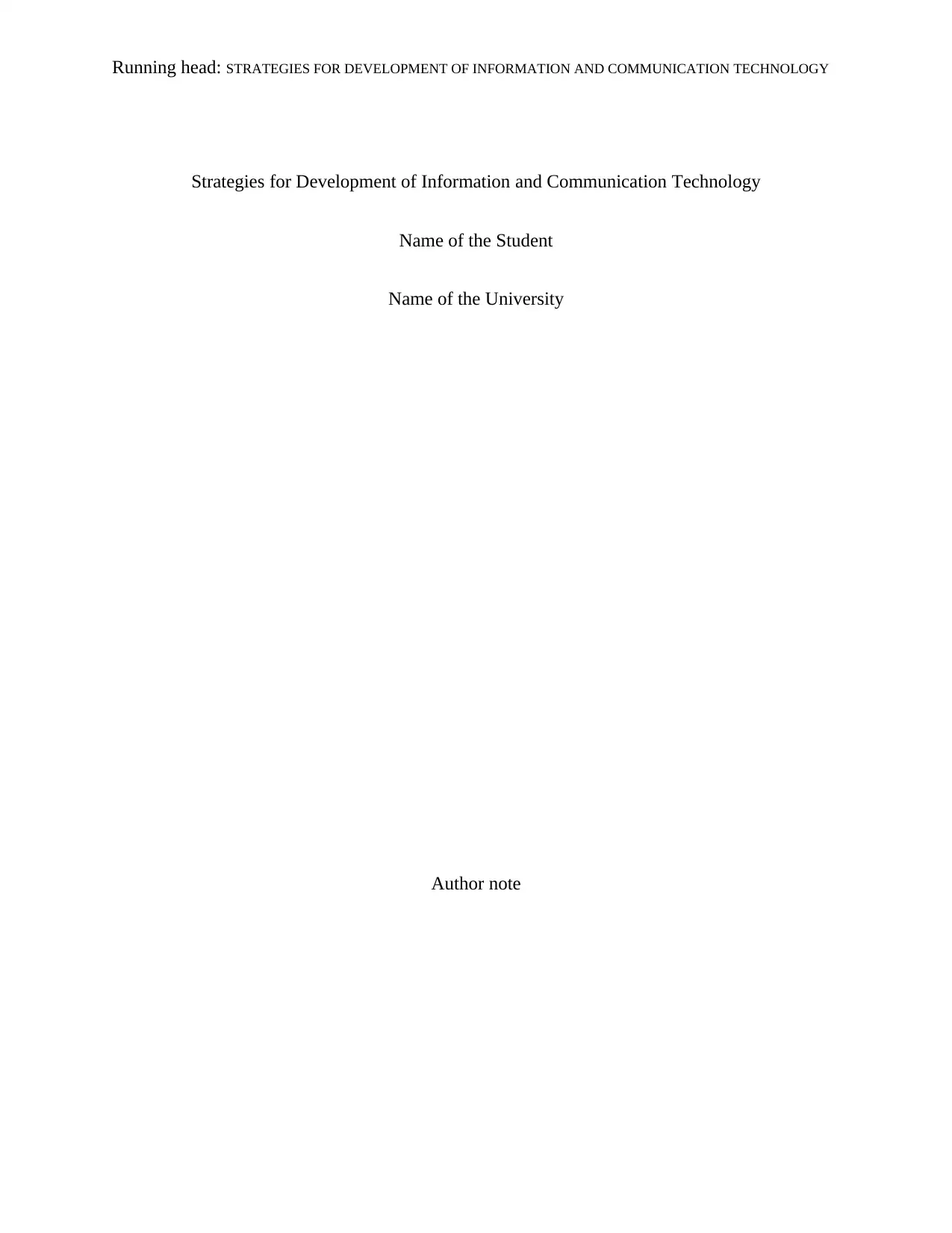
Running head: STRATEGIES FOR DEVELOPMENT OF INFORMATION AND COMMUNICATION TECHNOLOGY
Strategies for Development of Information and Communication Technology
Name of the Student
Name of the University
Author note
Strategies for Development of Information and Communication Technology
Name of the Student
Name of the University
Author note
Secure Best Marks with AI Grader
Need help grading? Try our AI Grader for instant feedback on your assignments.
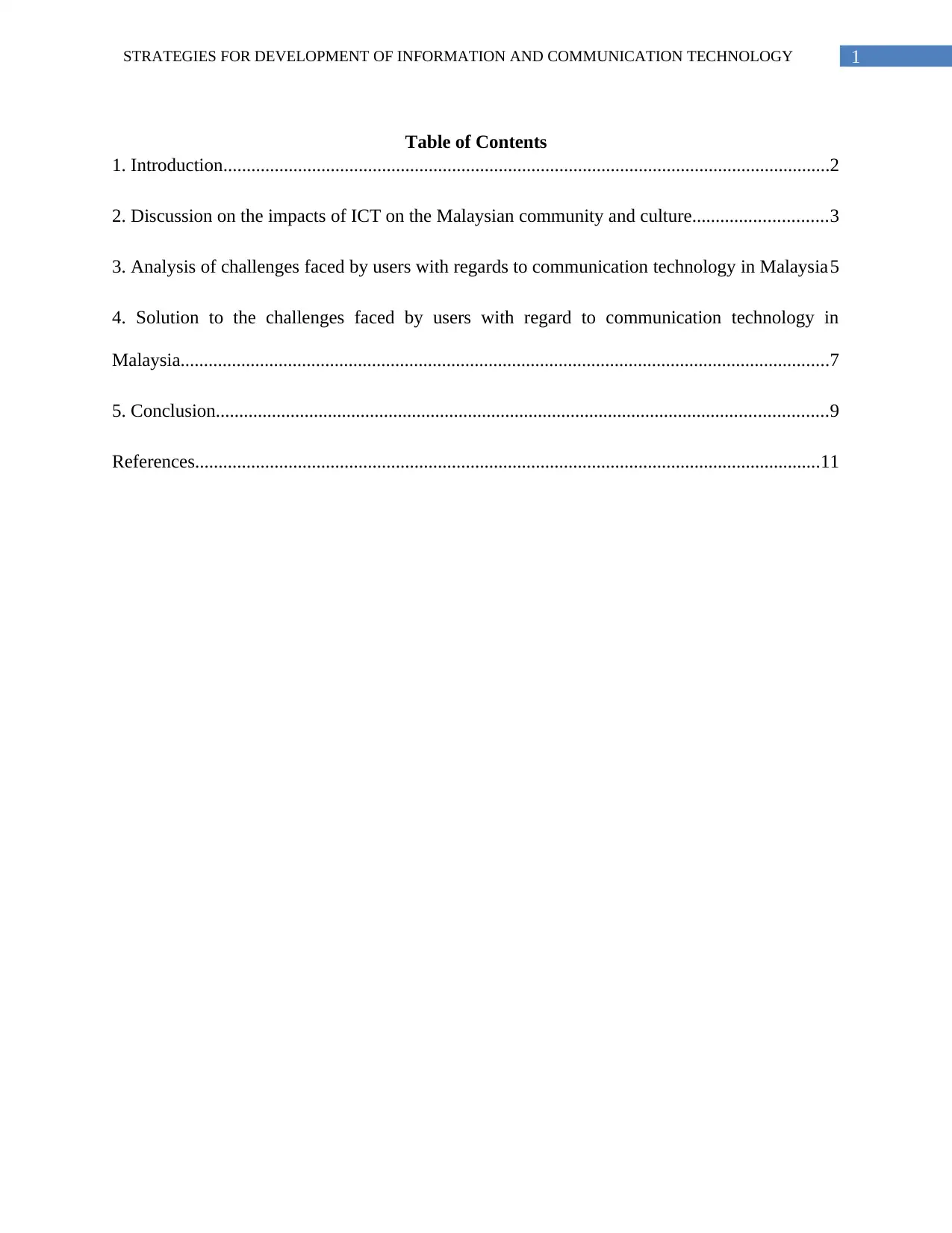
1STRATEGIES FOR DEVELOPMENT OF INFORMATION AND COMMUNICATION TECHNOLOGY
Table of Contents
1. Introduction..................................................................................................................................2
2. Discussion on the impacts of ICT on the Malaysian community and culture.............................3
3. Analysis of challenges faced by users with regards to communication technology in Malaysia5
4. Solution to the challenges faced by users with regard to communication technology in
Malaysia...........................................................................................................................................7
5. Conclusion...................................................................................................................................9
References......................................................................................................................................11
Table of Contents
1. Introduction..................................................................................................................................2
2. Discussion on the impacts of ICT on the Malaysian community and culture.............................3
3. Analysis of challenges faced by users with regards to communication technology in Malaysia5
4. Solution to the challenges faced by users with regard to communication technology in
Malaysia...........................................................................................................................................7
5. Conclusion...................................................................................................................................9
References......................................................................................................................................11
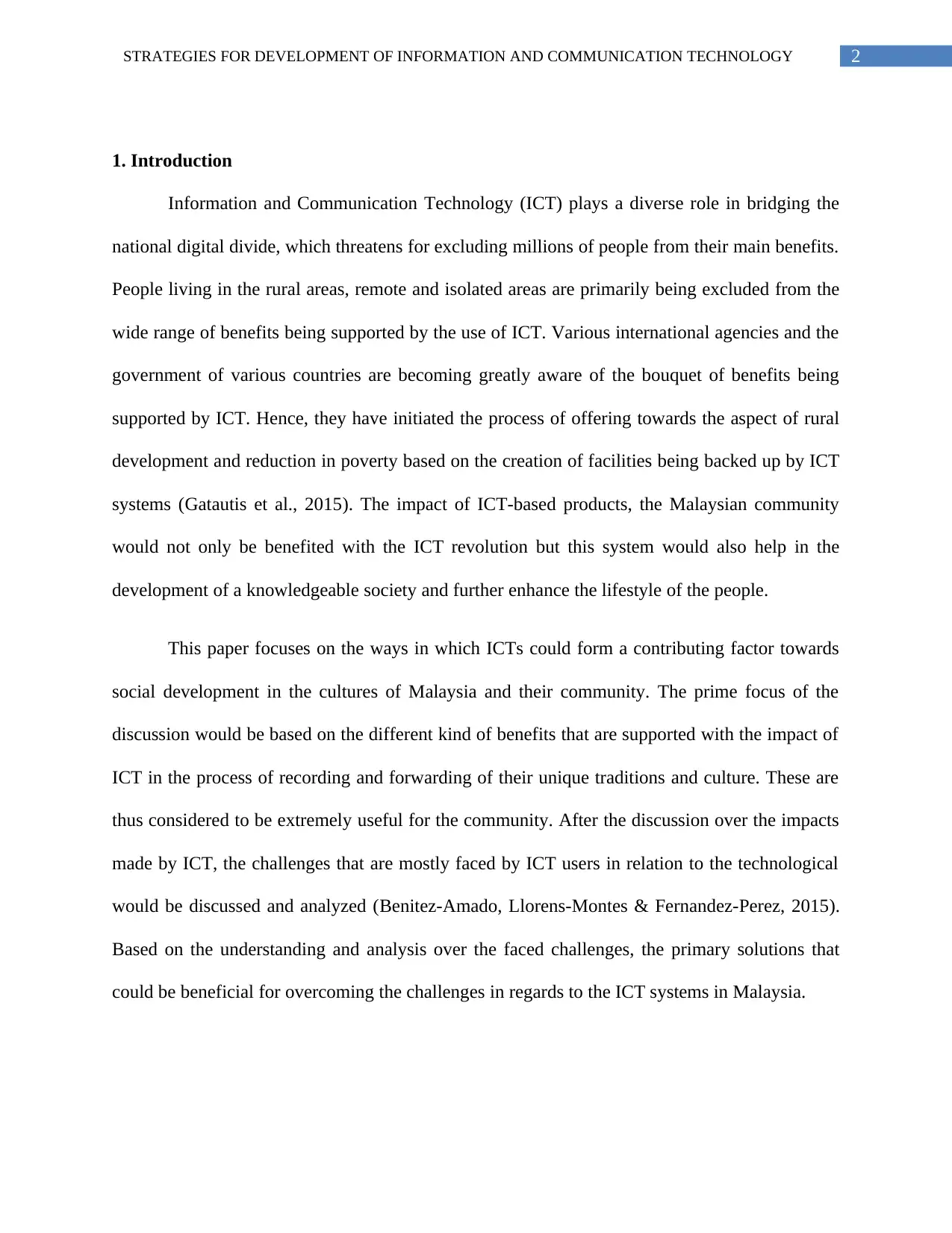
2STRATEGIES FOR DEVELOPMENT OF INFORMATION AND COMMUNICATION TECHNOLOGY
1. Introduction
Information and Communication Technology (ICT) plays a diverse role in bridging the
national digital divide, which threatens for excluding millions of people from their main benefits.
People living in the rural areas, remote and isolated areas are primarily being excluded from the
wide range of benefits being supported by the use of ICT. Various international agencies and the
government of various countries are becoming greatly aware of the bouquet of benefits being
supported by ICT. Hence, they have initiated the process of offering towards the aspect of rural
development and reduction in poverty based on the creation of facilities being backed up by ICT
systems (Gatautis et al., 2015). The impact of ICT-based products, the Malaysian community
would not only be benefited with the ICT revolution but this system would also help in the
development of a knowledgeable society and further enhance the lifestyle of the people.
This paper focuses on the ways in which ICTs could form a contributing factor towards
social development in the cultures of Malaysia and their community. The prime focus of the
discussion would be based on the different kind of benefits that are supported with the impact of
ICT in the process of recording and forwarding of their unique traditions and culture. These are
thus considered to be extremely useful for the community. After the discussion over the impacts
made by ICT, the challenges that are mostly faced by ICT users in relation to the technological
would be discussed and analyzed (Benitez-Amado, Llorens-Montes & Fernandez-Perez, 2015).
Based on the understanding and analysis over the faced challenges, the primary solutions that
could be beneficial for overcoming the challenges in regards to the ICT systems in Malaysia.
1. Introduction
Information and Communication Technology (ICT) plays a diverse role in bridging the
national digital divide, which threatens for excluding millions of people from their main benefits.
People living in the rural areas, remote and isolated areas are primarily being excluded from the
wide range of benefits being supported by the use of ICT. Various international agencies and the
government of various countries are becoming greatly aware of the bouquet of benefits being
supported by ICT. Hence, they have initiated the process of offering towards the aspect of rural
development and reduction in poverty based on the creation of facilities being backed up by ICT
systems (Gatautis et al., 2015). The impact of ICT-based products, the Malaysian community
would not only be benefited with the ICT revolution but this system would also help in the
development of a knowledgeable society and further enhance the lifestyle of the people.
This paper focuses on the ways in which ICTs could form a contributing factor towards
social development in the cultures of Malaysia and their community. The prime focus of the
discussion would be based on the different kind of benefits that are supported with the impact of
ICT in the process of recording and forwarding of their unique traditions and culture. These are
thus considered to be extremely useful for the community. After the discussion over the impacts
made by ICT, the challenges that are mostly faced by ICT users in relation to the technological
would be discussed and analyzed (Benitez-Amado, Llorens-Montes & Fernandez-Perez, 2015).
Based on the understanding and analysis over the faced challenges, the primary solutions that
could be beneficial for overcoming the challenges in regards to the ICT systems in Malaysia.
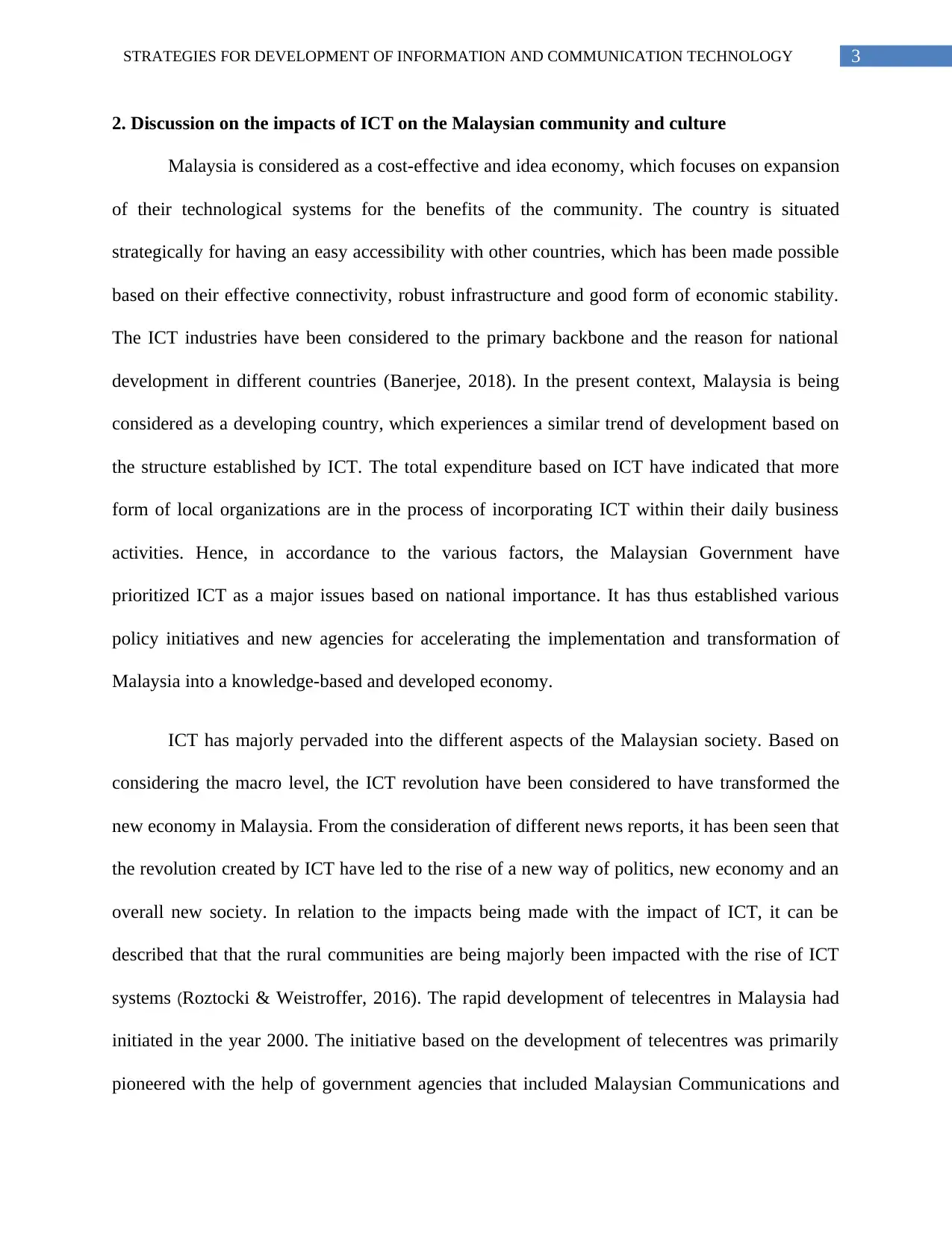
3STRATEGIES FOR DEVELOPMENT OF INFORMATION AND COMMUNICATION TECHNOLOGY
2. Discussion on the impacts of ICT on the Malaysian community and culture
Malaysia is considered as a cost-effective and idea economy, which focuses on expansion
of their technological systems for the benefits of the community. The country is situated
strategically for having an easy accessibility with other countries, which has been made possible
based on their effective connectivity, robust infrastructure and good form of economic stability.
The ICT industries have been considered to the primary backbone and the reason for national
development in different countries (Banerjee, 2018). In the present context, Malaysia is being
considered as a developing country, which experiences a similar trend of development based on
the structure established by ICT. The total expenditure based on ICT have indicated that more
form of local organizations are in the process of incorporating ICT within their daily business
activities. Hence, in accordance to the various factors, the Malaysian Government have
prioritized ICT as a major issues based on national importance. It has thus established various
policy initiatives and new agencies for accelerating the implementation and transformation of
Malaysia into a knowledge-based and developed economy.
ICT has majorly pervaded into the different aspects of the Malaysian society. Based on
considering the macro level, the ICT revolution have been considered to have transformed the
new economy in Malaysia. From the consideration of different news reports, it has been seen that
the revolution created by ICT have led to the rise of a new way of politics, new economy and an
overall new society. In relation to the impacts being made with the impact of ICT, it can be
described that that the rural communities are being majorly been impacted with the rise of ICT
systems (Roztocki & Weistroffer, 2016). The rapid development of telecentres in Malaysia had
initiated in the year 2000. The initiative based on the development of telecentres was primarily
pioneered with the help of government agencies that included Malaysian Communications and
2. Discussion on the impacts of ICT on the Malaysian community and culture
Malaysia is considered as a cost-effective and idea economy, which focuses on expansion
of their technological systems for the benefits of the community. The country is situated
strategically for having an easy accessibility with other countries, which has been made possible
based on their effective connectivity, robust infrastructure and good form of economic stability.
The ICT industries have been considered to the primary backbone and the reason for national
development in different countries (Banerjee, 2018). In the present context, Malaysia is being
considered as a developing country, which experiences a similar trend of development based on
the structure established by ICT. The total expenditure based on ICT have indicated that more
form of local organizations are in the process of incorporating ICT within their daily business
activities. Hence, in accordance to the various factors, the Malaysian Government have
prioritized ICT as a major issues based on national importance. It has thus established various
policy initiatives and new agencies for accelerating the implementation and transformation of
Malaysia into a knowledge-based and developed economy.
ICT has majorly pervaded into the different aspects of the Malaysian society. Based on
considering the macro level, the ICT revolution have been considered to have transformed the
new economy in Malaysia. From the consideration of different news reports, it has been seen that
the revolution created by ICT have led to the rise of a new way of politics, new economy and an
overall new society. In relation to the impacts being made with the impact of ICT, it can be
described that that the rural communities are being majorly been impacted with the rise of ICT
systems (Roztocki & Weistroffer, 2016). The rapid development of telecentres in Malaysia had
initiated in the year 2000. The initiative based on the development of telecentres was primarily
pioneered with the help of government agencies that included Malaysian Communications and
Secure Best Marks with AI Grader
Need help grading? Try our AI Grader for instant feedback on your assignments.
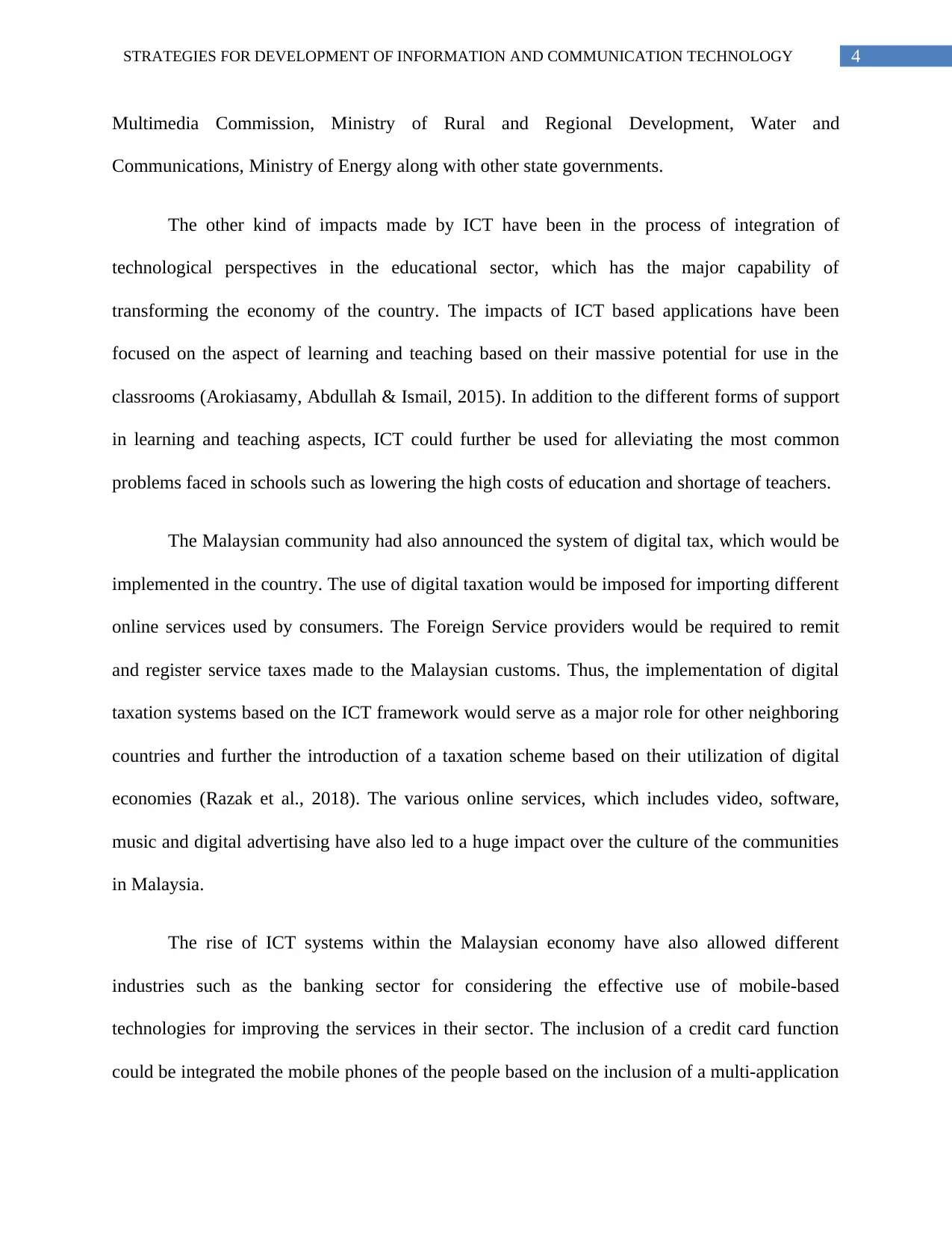
4STRATEGIES FOR DEVELOPMENT OF INFORMATION AND COMMUNICATION TECHNOLOGY
Multimedia Commission, Ministry of Rural and Regional Development, Water and
Communications, Ministry of Energy along with other state governments.
The other kind of impacts made by ICT have been in the process of integration of
technological perspectives in the educational sector, which has the major capability of
transforming the economy of the country. The impacts of ICT based applications have been
focused on the aspect of learning and teaching based on their massive potential for use in the
classrooms (Arokiasamy, Abdullah & Ismail, 2015). In addition to the different forms of support
in learning and teaching aspects, ICT could further be used for alleviating the most common
problems faced in schools such as lowering the high costs of education and shortage of teachers.
The Malaysian community had also announced the system of digital tax, which would be
implemented in the country. The use of digital taxation would be imposed for importing different
online services used by consumers. The Foreign Service providers would be required to remit
and register service taxes made to the Malaysian customs. Thus, the implementation of digital
taxation systems based on the ICT framework would serve as a major role for other neighboring
countries and further the introduction of a taxation scheme based on their utilization of digital
economies (Razak et al., 2018). The various online services, which includes video, software,
music and digital advertising have also led to a huge impact over the culture of the communities
in Malaysia.
The rise of ICT systems within the Malaysian economy have also allowed different
industries such as the banking sector for considering the effective use of mobile-based
technologies for improving the services in their sector. The inclusion of a credit card function
could be integrated the mobile phones of the people based on the inclusion of a multi-application
Multimedia Commission, Ministry of Rural and Regional Development, Water and
Communications, Ministry of Energy along with other state governments.
The other kind of impacts made by ICT have been in the process of integration of
technological perspectives in the educational sector, which has the major capability of
transforming the economy of the country. The impacts of ICT based applications have been
focused on the aspect of learning and teaching based on their massive potential for use in the
classrooms (Arokiasamy, Abdullah & Ismail, 2015). In addition to the different forms of support
in learning and teaching aspects, ICT could further be used for alleviating the most common
problems faced in schools such as lowering the high costs of education and shortage of teachers.
The Malaysian community had also announced the system of digital tax, which would be
implemented in the country. The use of digital taxation would be imposed for importing different
online services used by consumers. The Foreign Service providers would be required to remit
and register service taxes made to the Malaysian customs. Thus, the implementation of digital
taxation systems based on the ICT framework would serve as a major role for other neighboring
countries and further the introduction of a taxation scheme based on their utilization of digital
economies (Razak et al., 2018). The various online services, which includes video, software,
music and digital advertising have also led to a huge impact over the culture of the communities
in Malaysia.
The rise of ICT systems within the Malaysian economy have also allowed different
industries such as the banking sector for considering the effective use of mobile-based
technologies for improving the services in their sector. The inclusion of a credit card function
could be integrated the mobile phones of the people based on the inclusion of a multi-application
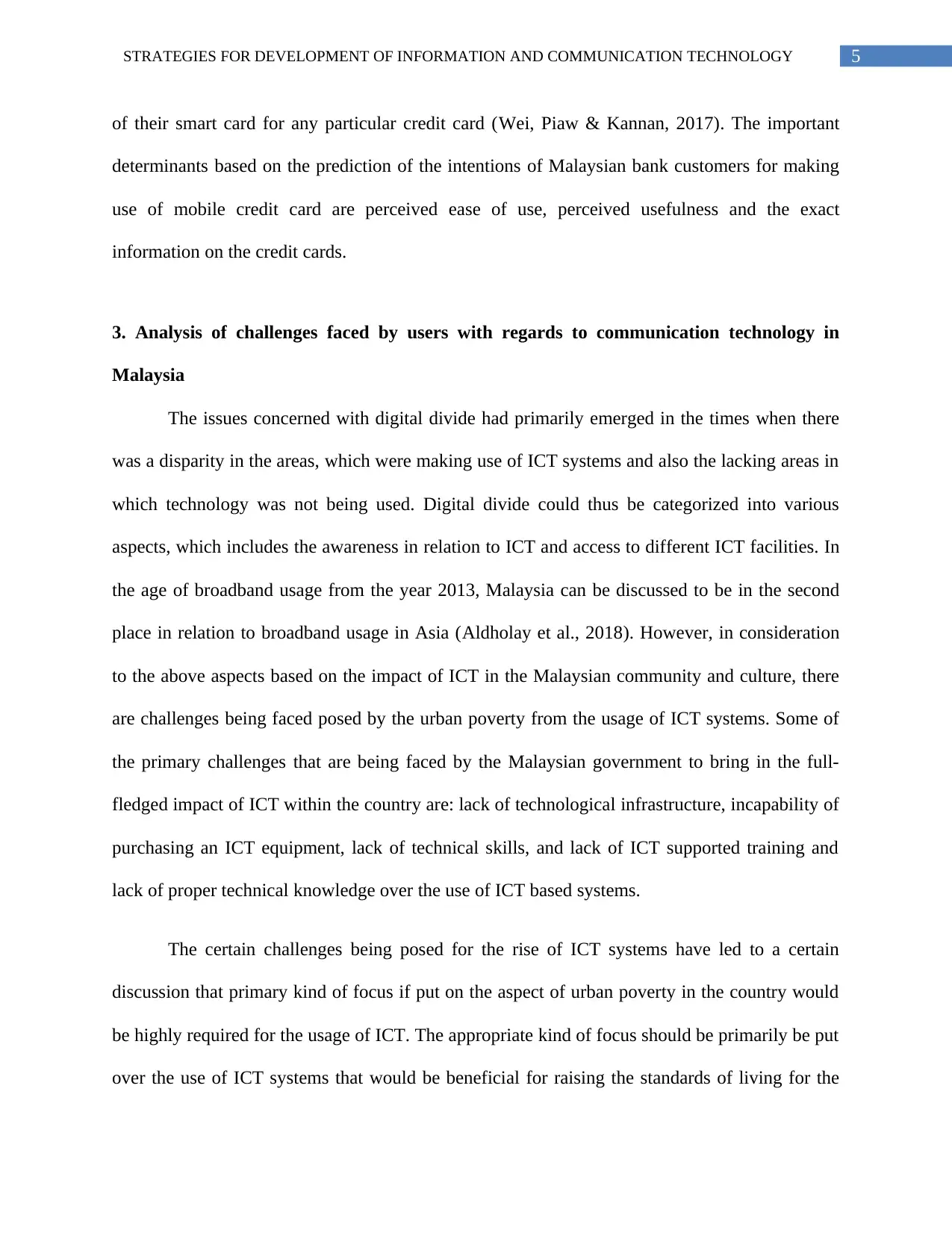
5STRATEGIES FOR DEVELOPMENT OF INFORMATION AND COMMUNICATION TECHNOLOGY
of their smart card for any particular credit card (Wei, Piaw & Kannan, 2017). The important
determinants based on the prediction of the intentions of Malaysian bank customers for making
use of mobile credit card are perceived ease of use, perceived usefulness and the exact
information on the credit cards.
3. Analysis of challenges faced by users with regards to communication technology in
Malaysia
The issues concerned with digital divide had primarily emerged in the times when there
was a disparity in the areas, which were making use of ICT systems and also the lacking areas in
which technology was not being used. Digital divide could thus be categorized into various
aspects, which includes the awareness in relation to ICT and access to different ICT facilities. In
the age of broadband usage from the year 2013, Malaysia can be discussed to be in the second
place in relation to broadband usage in Asia (Aldholay et al., 2018). However, in consideration
to the above aspects based on the impact of ICT in the Malaysian community and culture, there
are challenges being faced posed by the urban poverty from the usage of ICT systems. Some of
the primary challenges that are being faced by the Malaysian government to bring in the full-
fledged impact of ICT within the country are: lack of technological infrastructure, incapability of
purchasing an ICT equipment, lack of technical skills, and lack of ICT supported training and
lack of proper technical knowledge over the use of ICT based systems.
The certain challenges being posed for the rise of ICT systems have led to a certain
discussion that primary kind of focus if put on the aspect of urban poverty in the country would
be highly required for the usage of ICT. The appropriate kind of focus should be primarily be put
over the use of ICT systems that would be beneficial for raising the standards of living for the
of their smart card for any particular credit card (Wei, Piaw & Kannan, 2017). The important
determinants based on the prediction of the intentions of Malaysian bank customers for making
use of mobile credit card are perceived ease of use, perceived usefulness and the exact
information on the credit cards.
3. Analysis of challenges faced by users with regards to communication technology in
Malaysia
The issues concerned with digital divide had primarily emerged in the times when there
was a disparity in the areas, which were making use of ICT systems and also the lacking areas in
which technology was not being used. Digital divide could thus be categorized into various
aspects, which includes the awareness in relation to ICT and access to different ICT facilities. In
the age of broadband usage from the year 2013, Malaysia can be discussed to be in the second
place in relation to broadband usage in Asia (Aldholay et al., 2018). However, in consideration
to the above aspects based on the impact of ICT in the Malaysian community and culture, there
are challenges being faced posed by the urban poverty from the usage of ICT systems. Some of
the primary challenges that are being faced by the Malaysian government to bring in the full-
fledged impact of ICT within the country are: lack of technological infrastructure, incapability of
purchasing an ICT equipment, lack of technical skills, and lack of ICT supported training and
lack of proper technical knowledge over the use of ICT based systems.
The certain challenges being posed for the rise of ICT systems have led to a certain
discussion that primary kind of focus if put on the aspect of urban poverty in the country would
be highly required for the usage of ICT. The appropriate kind of focus should be primarily be put
over the use of ICT systems that would be beneficial for raising the standards of living for the
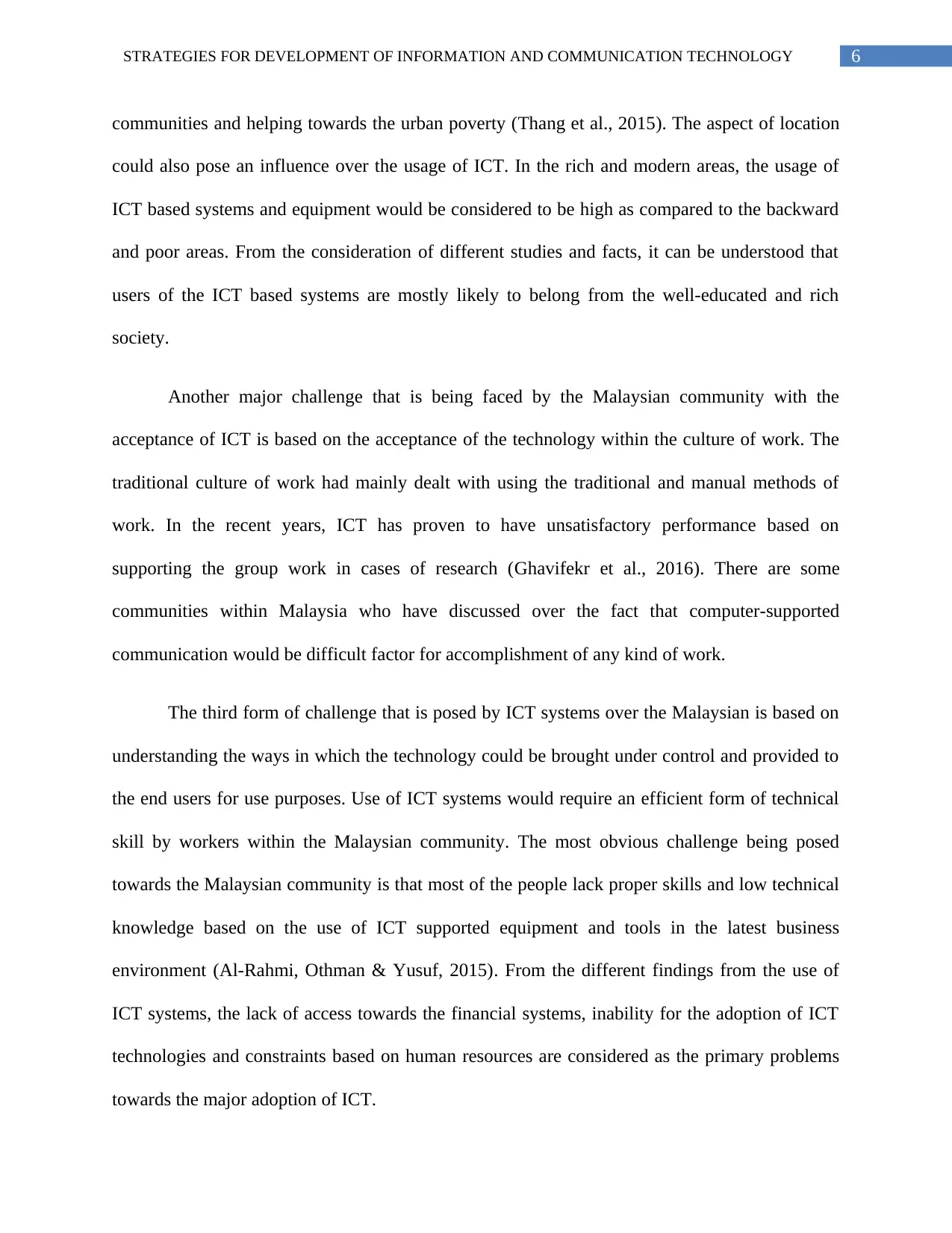
6STRATEGIES FOR DEVELOPMENT OF INFORMATION AND COMMUNICATION TECHNOLOGY
communities and helping towards the urban poverty (Thang et al., 2015). The aspect of location
could also pose an influence over the usage of ICT. In the rich and modern areas, the usage of
ICT based systems and equipment would be considered to be high as compared to the backward
and poor areas. From the consideration of different studies and facts, it can be understood that
users of the ICT based systems are mostly likely to belong from the well-educated and rich
society.
Another major challenge that is being faced by the Malaysian community with the
acceptance of ICT is based on the acceptance of the technology within the culture of work. The
traditional culture of work had mainly dealt with using the traditional and manual methods of
work. In the recent years, ICT has proven to have unsatisfactory performance based on
supporting the group work in cases of research (Ghavifekr et al., 2016). There are some
communities within Malaysia who have discussed over the fact that computer-supported
communication would be difficult factor for accomplishment of any kind of work.
The third form of challenge that is posed by ICT systems over the Malaysian is based on
understanding the ways in which the technology could be brought under control and provided to
the end users for use purposes. Use of ICT systems would require an efficient form of technical
skill by workers within the Malaysian community. The most obvious challenge being posed
towards the Malaysian community is that most of the people lack proper skills and low technical
knowledge based on the use of ICT supported equipment and tools in the latest business
environment (Al-Rahmi, Othman & Yusuf, 2015). From the different findings from the use of
ICT systems, the lack of access towards the financial systems, inability for the adoption of ICT
technologies and constraints based on human resources are considered as the primary problems
towards the major adoption of ICT.
communities and helping towards the urban poverty (Thang et al., 2015). The aspect of location
could also pose an influence over the usage of ICT. In the rich and modern areas, the usage of
ICT based systems and equipment would be considered to be high as compared to the backward
and poor areas. From the consideration of different studies and facts, it can be understood that
users of the ICT based systems are mostly likely to belong from the well-educated and rich
society.
Another major challenge that is being faced by the Malaysian community with the
acceptance of ICT is based on the acceptance of the technology within the culture of work. The
traditional culture of work had mainly dealt with using the traditional and manual methods of
work. In the recent years, ICT has proven to have unsatisfactory performance based on
supporting the group work in cases of research (Ghavifekr et al., 2016). There are some
communities within Malaysia who have discussed over the fact that computer-supported
communication would be difficult factor for accomplishment of any kind of work.
The third form of challenge that is posed by ICT systems over the Malaysian is based on
understanding the ways in which the technology could be brought under control and provided to
the end users for use purposes. Use of ICT systems would require an efficient form of technical
skill by workers within the Malaysian community. The most obvious challenge being posed
towards the Malaysian community is that most of the people lack proper skills and low technical
knowledge based on the use of ICT supported equipment and tools in the latest business
environment (Al-Rahmi, Othman & Yusuf, 2015). From the different findings from the use of
ICT systems, the lack of access towards the financial systems, inability for the adoption of ICT
technologies and constraints based on human resources are considered as the primary problems
towards the major adoption of ICT.
Paraphrase This Document
Need a fresh take? Get an instant paraphrase of this document with our AI Paraphraser
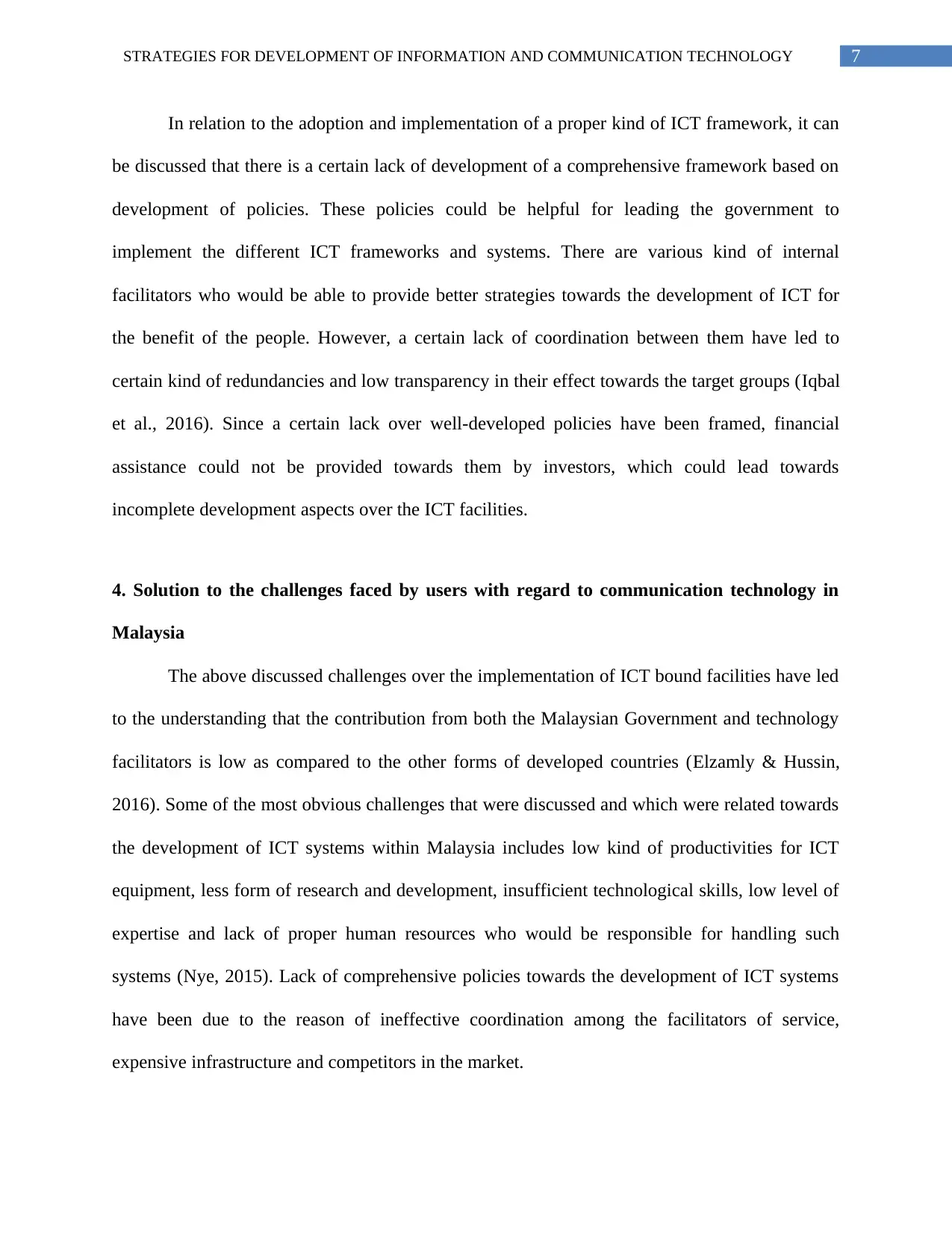
7STRATEGIES FOR DEVELOPMENT OF INFORMATION AND COMMUNICATION TECHNOLOGY
In relation to the adoption and implementation of a proper kind of ICT framework, it can
be discussed that there is a certain lack of development of a comprehensive framework based on
development of policies. These policies could be helpful for leading the government to
implement the different ICT frameworks and systems. There are various kind of internal
facilitators who would be able to provide better strategies towards the development of ICT for
the benefit of the people. However, a certain lack of coordination between them have led to
certain kind of redundancies and low transparency in their effect towards the target groups (Iqbal
et al., 2016). Since a certain lack over well-developed policies have been framed, financial
assistance could not be provided towards them by investors, which could lead towards
incomplete development aspects over the ICT facilities.
4. Solution to the challenges faced by users with regard to communication technology in
Malaysia
The above discussed challenges over the implementation of ICT bound facilities have led
to the understanding that the contribution from both the Malaysian Government and technology
facilitators is low as compared to the other forms of developed countries (Elzamly & Hussin,
2016). Some of the most obvious challenges that were discussed and which were related towards
the development of ICT systems within Malaysia includes low kind of productivities for ICT
equipment, less form of research and development, insufficient technological skills, low level of
expertise and lack of proper human resources who would be responsible for handling such
systems (Nye, 2015). Lack of comprehensive policies towards the development of ICT systems
have been due to the reason of ineffective coordination among the facilitators of service,
expensive infrastructure and competitors in the market.
In relation to the adoption and implementation of a proper kind of ICT framework, it can
be discussed that there is a certain lack of development of a comprehensive framework based on
development of policies. These policies could be helpful for leading the government to
implement the different ICT frameworks and systems. There are various kind of internal
facilitators who would be able to provide better strategies towards the development of ICT for
the benefit of the people. However, a certain lack of coordination between them have led to
certain kind of redundancies and low transparency in their effect towards the target groups (Iqbal
et al., 2016). Since a certain lack over well-developed policies have been framed, financial
assistance could not be provided towards them by investors, which could lead towards
incomplete development aspects over the ICT facilities.
4. Solution to the challenges faced by users with regard to communication technology in
Malaysia
The above discussed challenges over the implementation of ICT bound facilities have led
to the understanding that the contribution from both the Malaysian Government and technology
facilitators is low as compared to the other forms of developed countries (Elzamly & Hussin,
2016). Some of the most obvious challenges that were discussed and which were related towards
the development of ICT systems within Malaysia includes low kind of productivities for ICT
equipment, less form of research and development, insufficient technological skills, low level of
expertise and lack of proper human resources who would be responsible for handling such
systems (Nye, 2015). Lack of comprehensive policies towards the development of ICT systems
have been due to the reason of ineffective coordination among the facilitators of service,
expensive infrastructure and competitors in the market.
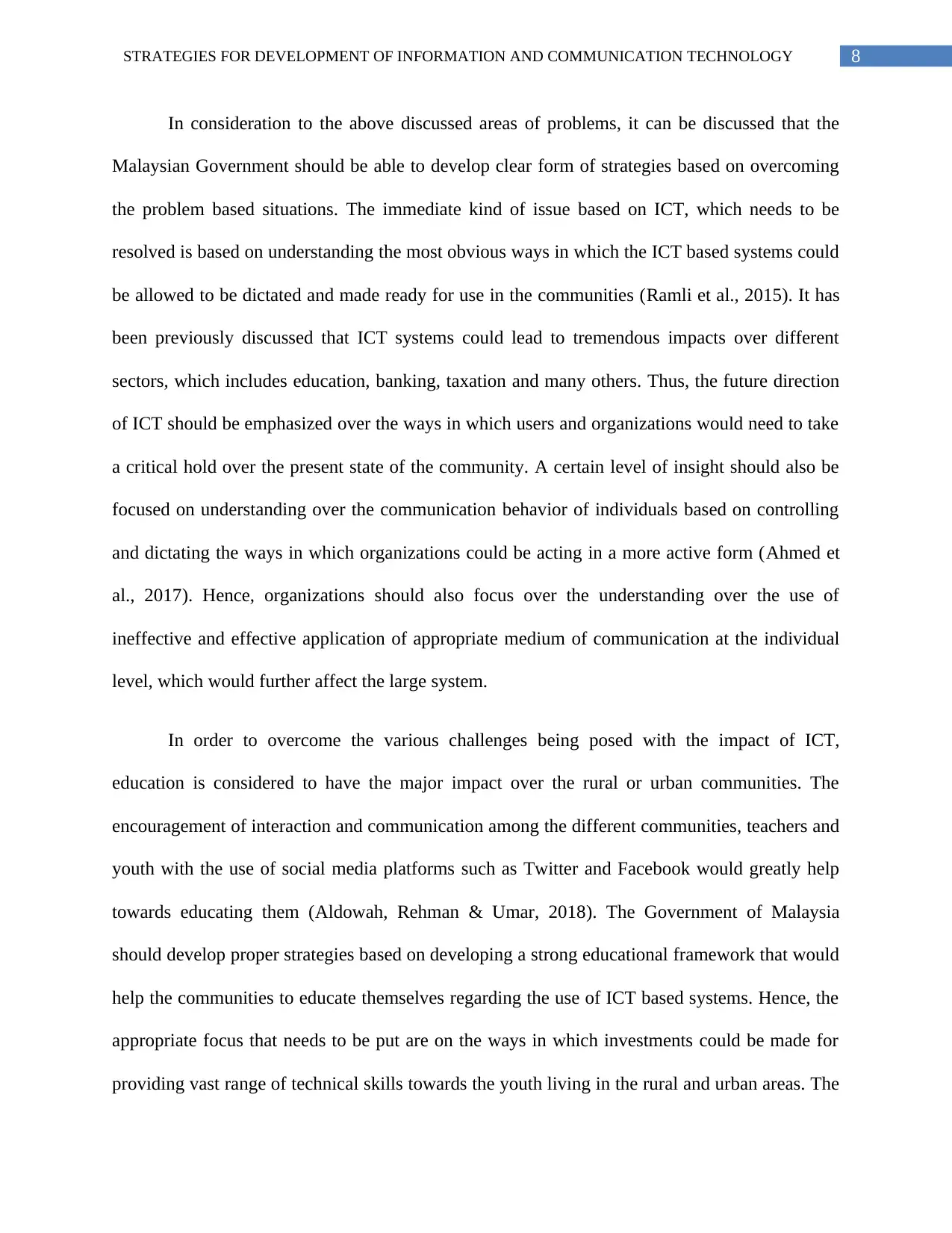
8STRATEGIES FOR DEVELOPMENT OF INFORMATION AND COMMUNICATION TECHNOLOGY
In consideration to the above discussed areas of problems, it can be discussed that the
Malaysian Government should be able to develop clear form of strategies based on overcoming
the problem based situations. The immediate kind of issue based on ICT, which needs to be
resolved is based on understanding the most obvious ways in which the ICT based systems could
be allowed to be dictated and made ready for use in the communities (Ramli et al., 2015). It has
been previously discussed that ICT systems could lead to tremendous impacts over different
sectors, which includes education, banking, taxation and many others. Thus, the future direction
of ICT should be emphasized over the ways in which users and organizations would need to take
a critical hold over the present state of the community. A certain level of insight should also be
focused on understanding over the communication behavior of individuals based on controlling
and dictating the ways in which organizations could be acting in a more active form (Ahmed et
al., 2017). Hence, organizations should also focus over the understanding over the use of
ineffective and effective application of appropriate medium of communication at the individual
level, which would further affect the large system.
In order to overcome the various challenges being posed with the impact of ICT,
education is considered to have the major impact over the rural or urban communities. The
encouragement of interaction and communication among the different communities, teachers and
youth with the use of social media platforms such as Twitter and Facebook would greatly help
towards educating them (Aldowah, Rehman & Umar, 2018). The Government of Malaysia
should develop proper strategies based on developing a strong educational framework that would
help the communities to educate themselves regarding the use of ICT based systems. Hence, the
appropriate focus that needs to be put are on the ways in which investments could be made for
providing vast range of technical skills towards the youth living in the rural and urban areas. The
In consideration to the above discussed areas of problems, it can be discussed that the
Malaysian Government should be able to develop clear form of strategies based on overcoming
the problem based situations. The immediate kind of issue based on ICT, which needs to be
resolved is based on understanding the most obvious ways in which the ICT based systems could
be allowed to be dictated and made ready for use in the communities (Ramli et al., 2015). It has
been previously discussed that ICT systems could lead to tremendous impacts over different
sectors, which includes education, banking, taxation and many others. Thus, the future direction
of ICT should be emphasized over the ways in which users and organizations would need to take
a critical hold over the present state of the community. A certain level of insight should also be
focused on understanding over the communication behavior of individuals based on controlling
and dictating the ways in which organizations could be acting in a more active form (Ahmed et
al., 2017). Hence, organizations should also focus over the understanding over the use of
ineffective and effective application of appropriate medium of communication at the individual
level, which would further affect the large system.
In order to overcome the various challenges being posed with the impact of ICT,
education is considered to have the major impact over the rural or urban communities. The
encouragement of interaction and communication among the different communities, teachers and
youth with the use of social media platforms such as Twitter and Facebook would greatly help
towards educating them (Aldowah, Rehman & Umar, 2018). The Government of Malaysia
should develop proper strategies based on developing a strong educational framework that would
help the communities to educate themselves regarding the use of ICT based systems. Hence, the
appropriate focus that needs to be put are on the ways in which investments could be made for
providing vast range of technical skills towards the youth living in the rural and urban areas. The
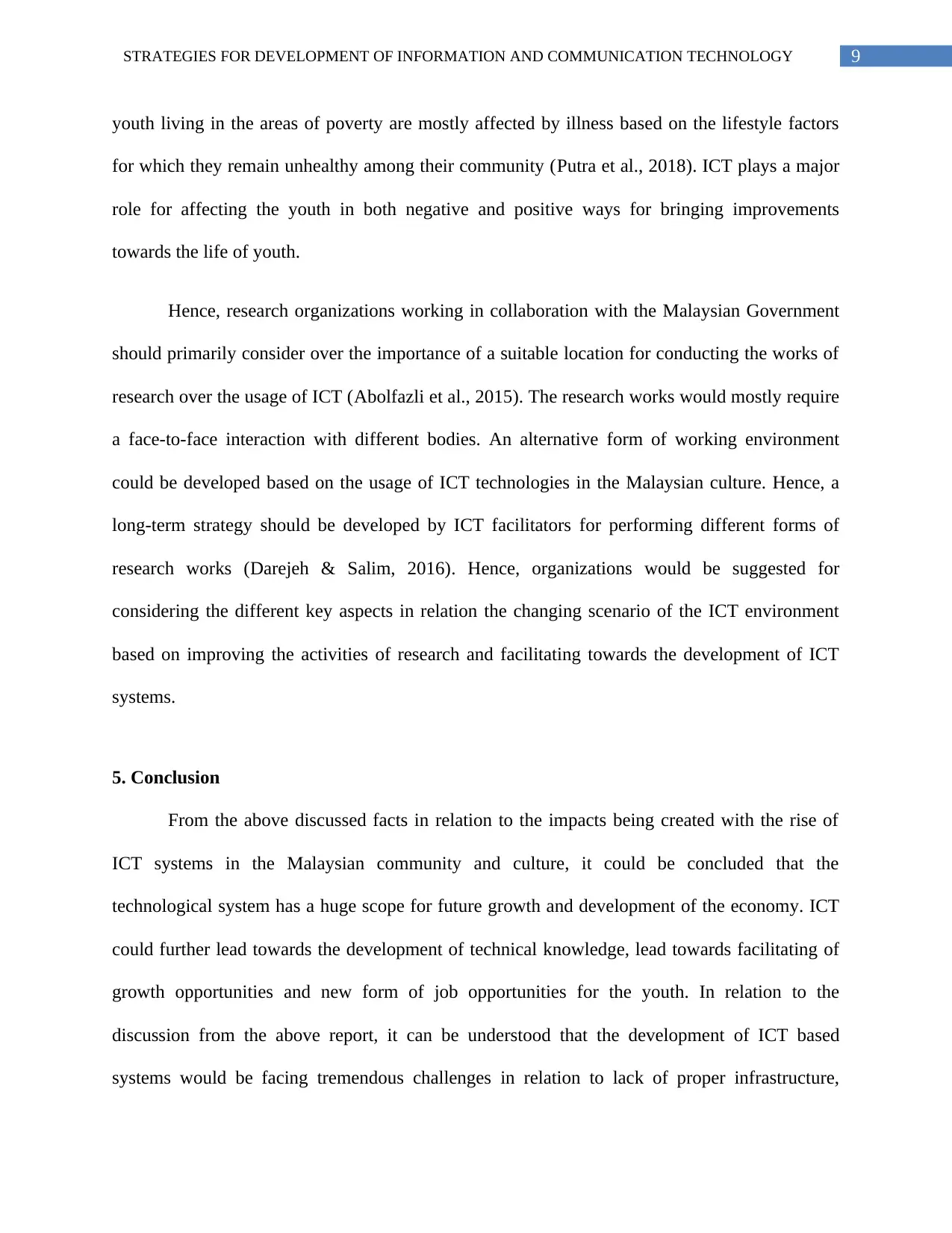
9STRATEGIES FOR DEVELOPMENT OF INFORMATION AND COMMUNICATION TECHNOLOGY
youth living in the areas of poverty are mostly affected by illness based on the lifestyle factors
for which they remain unhealthy among their community (Putra et al., 2018). ICT plays a major
role for affecting the youth in both negative and positive ways for bringing improvements
towards the life of youth.
Hence, research organizations working in collaboration with the Malaysian Government
should primarily consider over the importance of a suitable location for conducting the works of
research over the usage of ICT (Abolfazli et al., 2015). The research works would mostly require
a face-to-face interaction with different bodies. An alternative form of working environment
could be developed based on the usage of ICT technologies in the Malaysian culture. Hence, a
long-term strategy should be developed by ICT facilitators for performing different forms of
research works (Darejeh & Salim, 2016). Hence, organizations would be suggested for
considering the different key aspects in relation the changing scenario of the ICT environment
based on improving the activities of research and facilitating towards the development of ICT
systems.
5. Conclusion
From the above discussed facts in relation to the impacts being created with the rise of
ICT systems in the Malaysian community and culture, it could be concluded that the
technological system has a huge scope for future growth and development of the economy. ICT
could further lead towards the development of technical knowledge, lead towards facilitating of
growth opportunities and new form of job opportunities for the youth. In relation to the
discussion from the above report, it can be understood that the development of ICT based
systems would be facing tremendous challenges in relation to lack of proper infrastructure,
youth living in the areas of poverty are mostly affected by illness based on the lifestyle factors
for which they remain unhealthy among their community (Putra et al., 2018). ICT plays a major
role for affecting the youth in both negative and positive ways for bringing improvements
towards the life of youth.
Hence, research organizations working in collaboration with the Malaysian Government
should primarily consider over the importance of a suitable location for conducting the works of
research over the usage of ICT (Abolfazli et al., 2015). The research works would mostly require
a face-to-face interaction with different bodies. An alternative form of working environment
could be developed based on the usage of ICT technologies in the Malaysian culture. Hence, a
long-term strategy should be developed by ICT facilitators for performing different forms of
research works (Darejeh & Salim, 2016). Hence, organizations would be suggested for
considering the different key aspects in relation the changing scenario of the ICT environment
based on improving the activities of research and facilitating towards the development of ICT
systems.
5. Conclusion
From the above discussed facts in relation to the impacts being created with the rise of
ICT systems in the Malaysian community and culture, it could be concluded that the
technological system has a huge scope for future growth and development of the economy. ICT
could further lead towards the development of technical knowledge, lead towards facilitating of
growth opportunities and new form of job opportunities for the youth. In relation to the
discussion from the above report, it can be understood that the development of ICT based
systems would be facing tremendous challenges in relation to lack of proper infrastructure,
Secure Best Marks with AI Grader
Need help grading? Try our AI Grader for instant feedback on your assignments.
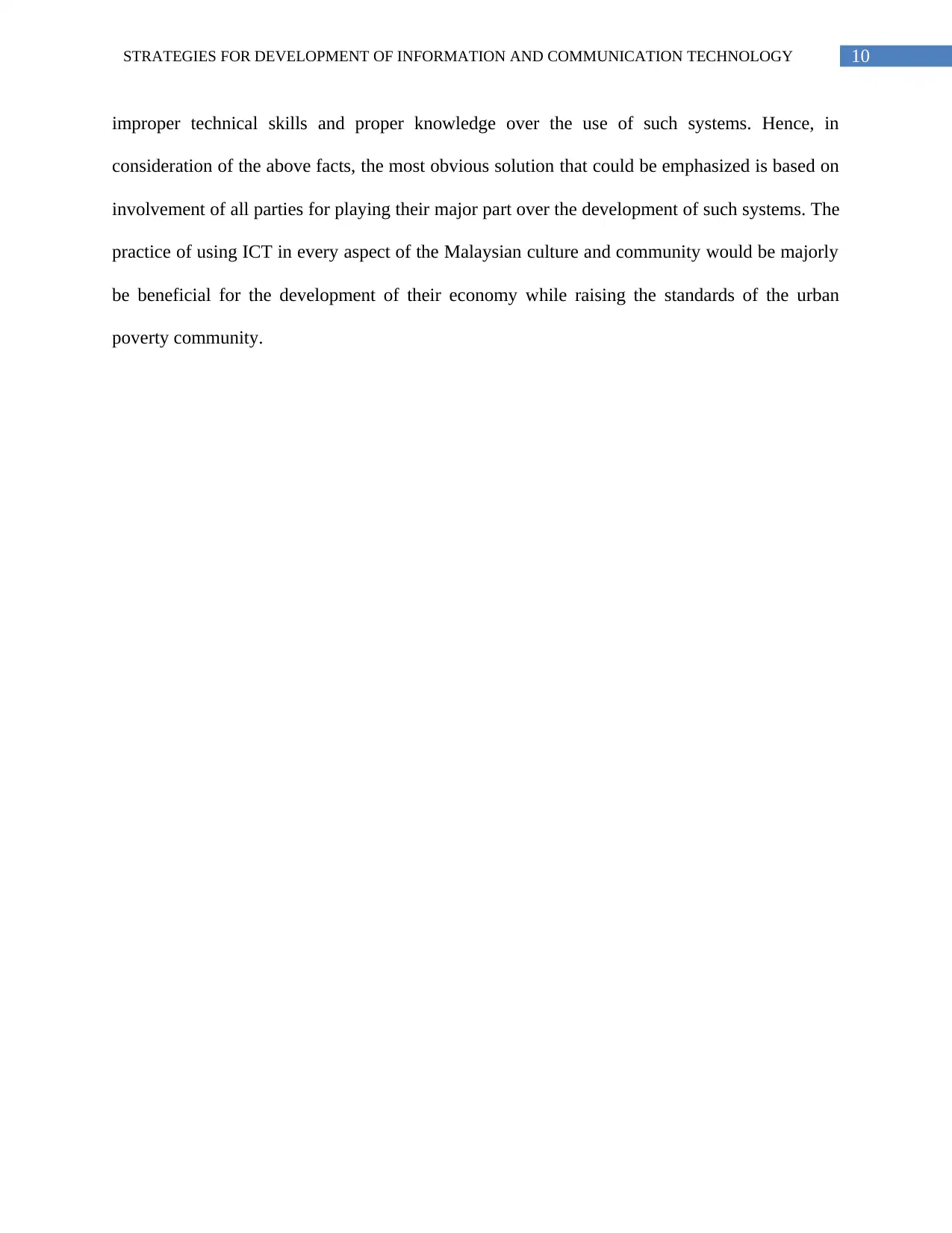
10STRATEGIES FOR DEVELOPMENT OF INFORMATION AND COMMUNICATION TECHNOLOGY
improper technical skills and proper knowledge over the use of such systems. Hence, in
consideration of the above facts, the most obvious solution that could be emphasized is based on
involvement of all parties for playing their major part over the development of such systems. The
practice of using ICT in every aspect of the Malaysian culture and community would be majorly
be beneficial for the development of their economy while raising the standards of the urban
poverty community.
improper technical skills and proper knowledge over the use of such systems. Hence, in
consideration of the above facts, the most obvious solution that could be emphasized is based on
involvement of all parties for playing their major part over the development of such systems. The
practice of using ICT in every aspect of the Malaysian culture and community would be majorly
be beneficial for the development of their economy while raising the standards of the urban
poverty community.
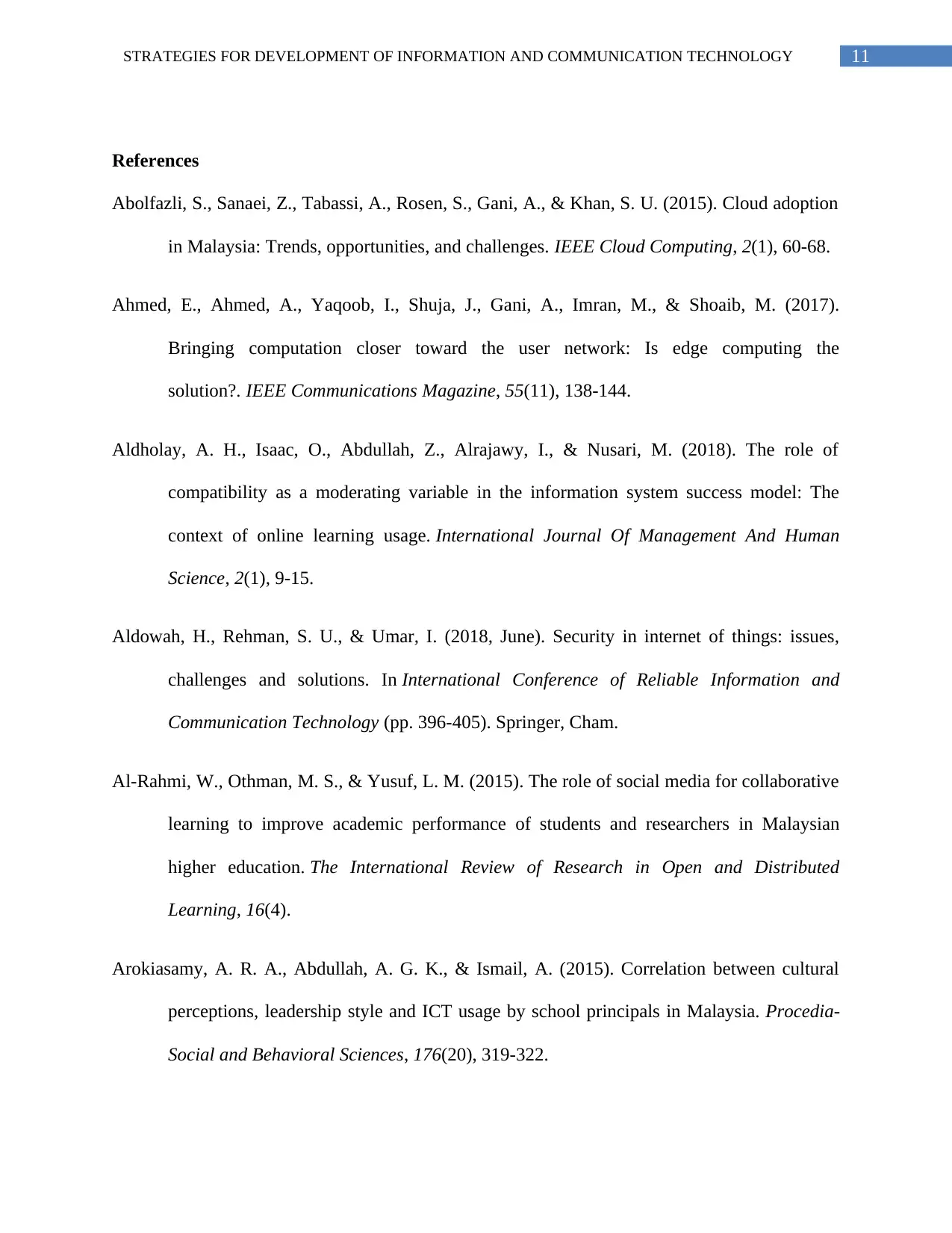
11STRATEGIES FOR DEVELOPMENT OF INFORMATION AND COMMUNICATION TECHNOLOGY
References
Abolfazli, S., Sanaei, Z., Tabassi, A., Rosen, S., Gani, A., & Khan, S. U. (2015). Cloud adoption
in Malaysia: Trends, opportunities, and challenges. IEEE Cloud Computing, 2(1), 60-68.
Ahmed, E., Ahmed, A., Yaqoob, I., Shuja, J., Gani, A., Imran, M., & Shoaib, M. (2017).
Bringing computation closer toward the user network: Is edge computing the
solution?. IEEE Communications Magazine, 55(11), 138-144.
Aldholay, A. H., Isaac, O., Abdullah, Z., Alrajawy, I., & Nusari, M. (2018). The role of
compatibility as a moderating variable in the information system success model: The
context of online learning usage. International Journal Of Management And Human
Science, 2(1), 9-15.
Aldowah, H., Rehman, S. U., & Umar, I. (2018, June). Security in internet of things: issues,
challenges and solutions. In International Conference of Reliable Information and
Communication Technology (pp. 396-405). Springer, Cham.
Al-Rahmi, W., Othman, M. S., & Yusuf, L. M. (2015). The role of social media for collaborative
learning to improve academic performance of students and researchers in Malaysian
higher education. The International Review of Research in Open and Distributed
Learning, 16(4).
Arokiasamy, A. R. A., Abdullah, A. G. K., & Ismail, A. (2015). Correlation between cultural
perceptions, leadership style and ICT usage by school principals in Malaysia. Procedia-
Social and Behavioral Sciences, 176(20), 319-322.
References
Abolfazli, S., Sanaei, Z., Tabassi, A., Rosen, S., Gani, A., & Khan, S. U. (2015). Cloud adoption
in Malaysia: Trends, opportunities, and challenges. IEEE Cloud Computing, 2(1), 60-68.
Ahmed, E., Ahmed, A., Yaqoob, I., Shuja, J., Gani, A., Imran, M., & Shoaib, M. (2017).
Bringing computation closer toward the user network: Is edge computing the
solution?. IEEE Communications Magazine, 55(11), 138-144.
Aldholay, A. H., Isaac, O., Abdullah, Z., Alrajawy, I., & Nusari, M. (2018). The role of
compatibility as a moderating variable in the information system success model: The
context of online learning usage. International Journal Of Management And Human
Science, 2(1), 9-15.
Aldowah, H., Rehman, S. U., & Umar, I. (2018, June). Security in internet of things: issues,
challenges and solutions. In International Conference of Reliable Information and
Communication Technology (pp. 396-405). Springer, Cham.
Al-Rahmi, W., Othman, M. S., & Yusuf, L. M. (2015). The role of social media for collaborative
learning to improve academic performance of students and researchers in Malaysian
higher education. The International Review of Research in Open and Distributed
Learning, 16(4).
Arokiasamy, A. R. A., Abdullah, A. G. K., & Ismail, A. (2015). Correlation between cultural
perceptions, leadership style and ICT usage by school principals in Malaysia. Procedia-
Social and Behavioral Sciences, 176(20), 319-322.
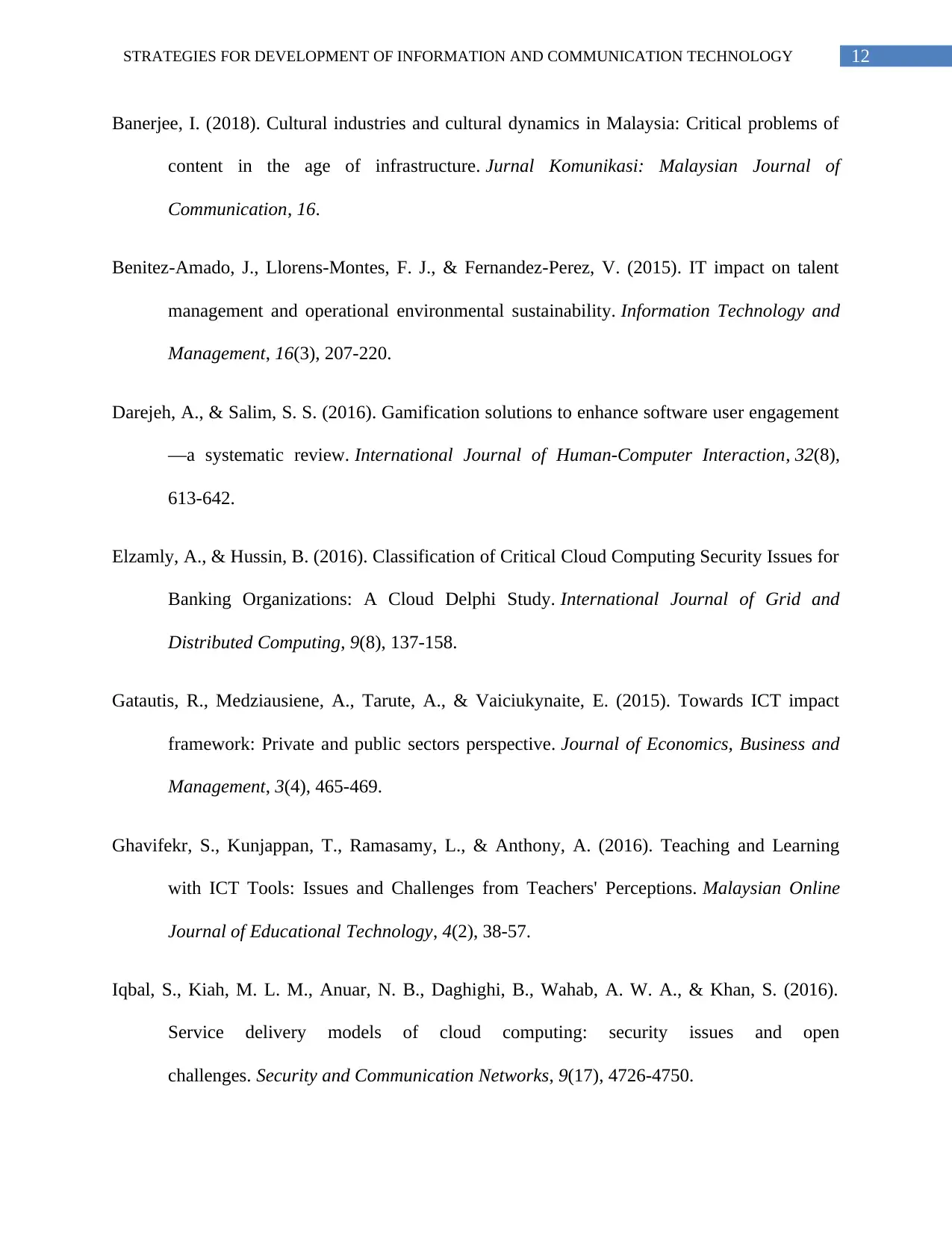
12STRATEGIES FOR DEVELOPMENT OF INFORMATION AND COMMUNICATION TECHNOLOGY
Banerjee, I. (2018). Cultural industries and cultural dynamics in Malaysia: Critical problems of
content in the age of infrastructure. Jurnal Komunikasi: Malaysian Journal of
Communication, 16.
Benitez-Amado, J., Llorens-Montes, F. J., & Fernandez-Perez, V. (2015). IT impact on talent
management and operational environmental sustainability. Information Technology and
Management, 16(3), 207-220.
Darejeh, A., & Salim, S. S. (2016). Gamification solutions to enhance software user engagement
—a systematic review. International Journal of Human-Computer Interaction, 32(8),
613-642.
Elzamly, A., & Hussin, B. (2016). Classification of Critical Cloud Computing Security Issues for
Banking Organizations: A Cloud Delphi Study. International Journal of Grid and
Distributed Computing, 9(8), 137-158.
Gatautis, R., Medziausiene, A., Tarute, A., & Vaiciukynaite, E. (2015). Towards ICT impact
framework: Private and public sectors perspective. Journal of Economics, Business and
Management, 3(4), 465-469.
Ghavifekr, S., Kunjappan, T., Ramasamy, L., & Anthony, A. (2016). Teaching and Learning
with ICT Tools: Issues and Challenges from Teachers' Perceptions. Malaysian Online
Journal of Educational Technology, 4(2), 38-57.
Iqbal, S., Kiah, M. L. M., Anuar, N. B., Daghighi, B., Wahab, A. W. A., & Khan, S. (2016).
Service delivery models of cloud computing: security issues and open
challenges. Security and Communication Networks, 9(17), 4726-4750.
Banerjee, I. (2018). Cultural industries and cultural dynamics in Malaysia: Critical problems of
content in the age of infrastructure. Jurnal Komunikasi: Malaysian Journal of
Communication, 16.
Benitez-Amado, J., Llorens-Montes, F. J., & Fernandez-Perez, V. (2015). IT impact on talent
management and operational environmental sustainability. Information Technology and
Management, 16(3), 207-220.
Darejeh, A., & Salim, S. S. (2016). Gamification solutions to enhance software user engagement
—a systematic review. International Journal of Human-Computer Interaction, 32(8),
613-642.
Elzamly, A., & Hussin, B. (2016). Classification of Critical Cloud Computing Security Issues for
Banking Organizations: A Cloud Delphi Study. International Journal of Grid and
Distributed Computing, 9(8), 137-158.
Gatautis, R., Medziausiene, A., Tarute, A., & Vaiciukynaite, E. (2015). Towards ICT impact
framework: Private and public sectors perspective. Journal of Economics, Business and
Management, 3(4), 465-469.
Ghavifekr, S., Kunjappan, T., Ramasamy, L., & Anthony, A. (2016). Teaching and Learning
with ICT Tools: Issues and Challenges from Teachers' Perceptions. Malaysian Online
Journal of Educational Technology, 4(2), 38-57.
Iqbal, S., Kiah, M. L. M., Anuar, N. B., Daghighi, B., Wahab, A. W. A., & Khan, S. (2016).
Service delivery models of cloud computing: security issues and open
challenges. Security and Communication Networks, 9(17), 4726-4750.
Paraphrase This Document
Need a fresh take? Get an instant paraphrase of this document with our AI Paraphraser
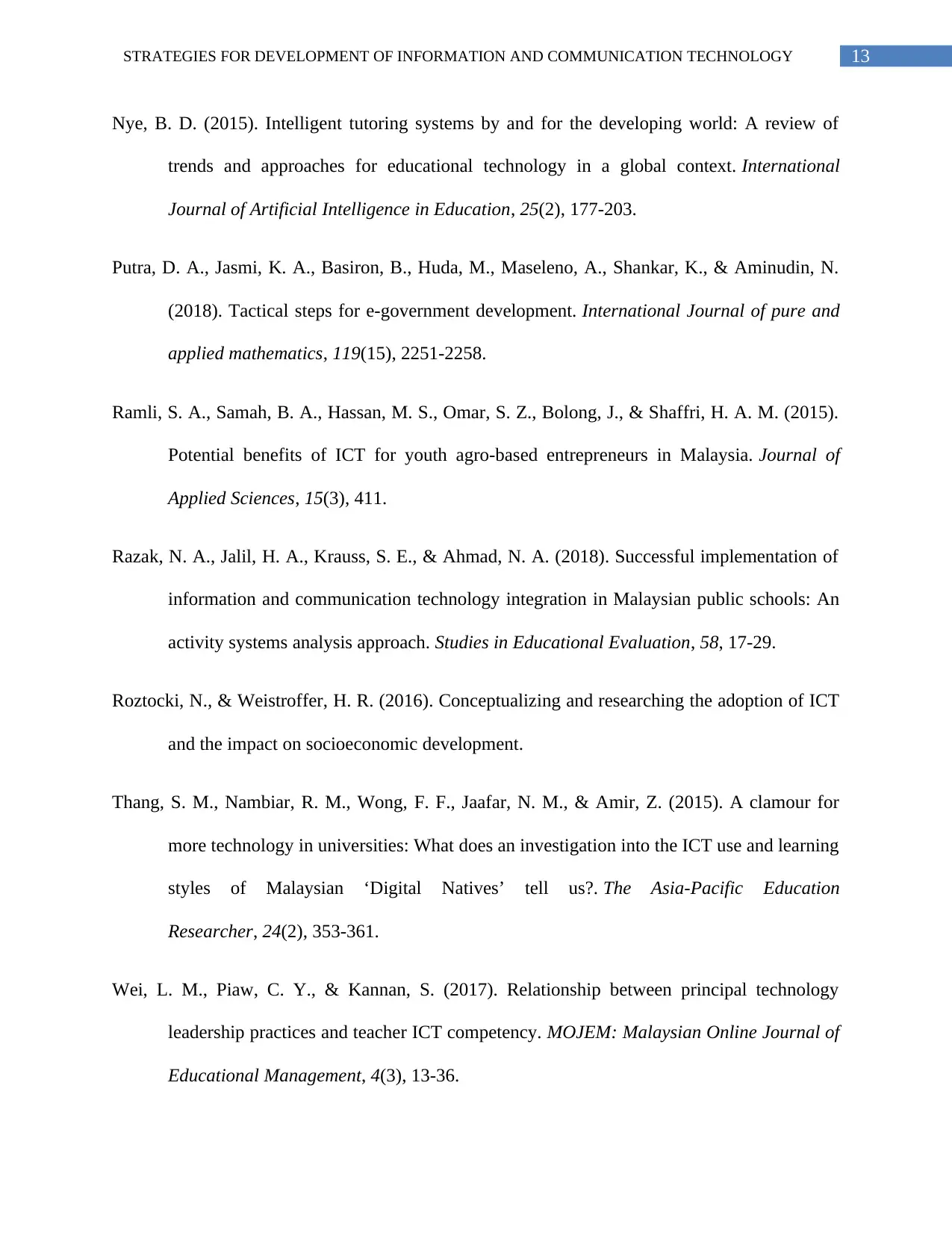
13STRATEGIES FOR DEVELOPMENT OF INFORMATION AND COMMUNICATION TECHNOLOGY
Nye, B. D. (2015). Intelligent tutoring systems by and for the developing world: A review of
trends and approaches for educational technology in a global context. International
Journal of Artificial Intelligence in Education, 25(2), 177-203.
Putra, D. A., Jasmi, K. A., Basiron, B., Huda, M., Maseleno, A., Shankar, K., & Aminudin, N.
(2018). Tactical steps for e-government development. International Journal of pure and
applied mathematics, 119(15), 2251-2258.
Ramli, S. A., Samah, B. A., Hassan, M. S., Omar, S. Z., Bolong, J., & Shaffri, H. A. M. (2015).
Potential benefits of ICT for youth agro-based entrepreneurs in Malaysia. Journal of
Applied Sciences, 15(3), 411.
Razak, N. A., Jalil, H. A., Krauss, S. E., & Ahmad, N. A. (2018). Successful implementation of
information and communication technology integration in Malaysian public schools: An
activity systems analysis approach. Studies in Educational Evaluation, 58, 17-29.
Roztocki, N., & Weistroffer, H. R. (2016). Conceptualizing and researching the adoption of ICT
and the impact on socioeconomic development.
Thang, S. M., Nambiar, R. M., Wong, F. F., Jaafar, N. M., & Amir, Z. (2015). A clamour for
more technology in universities: What does an investigation into the ICT use and learning
styles of Malaysian ‘Digital Natives’ tell us?. The Asia-Pacific Education
Researcher, 24(2), 353-361.
Wei, L. M., Piaw, C. Y., & Kannan, S. (2017). Relationship between principal technology
leadership practices and teacher ICT competency. MOJEM: Malaysian Online Journal of
Educational Management, 4(3), 13-36.
Nye, B. D. (2015). Intelligent tutoring systems by and for the developing world: A review of
trends and approaches for educational technology in a global context. International
Journal of Artificial Intelligence in Education, 25(2), 177-203.
Putra, D. A., Jasmi, K. A., Basiron, B., Huda, M., Maseleno, A., Shankar, K., & Aminudin, N.
(2018). Tactical steps for e-government development. International Journal of pure and
applied mathematics, 119(15), 2251-2258.
Ramli, S. A., Samah, B. A., Hassan, M. S., Omar, S. Z., Bolong, J., & Shaffri, H. A. M. (2015).
Potential benefits of ICT for youth agro-based entrepreneurs in Malaysia. Journal of
Applied Sciences, 15(3), 411.
Razak, N. A., Jalil, H. A., Krauss, S. E., & Ahmad, N. A. (2018). Successful implementation of
information and communication technology integration in Malaysian public schools: An
activity systems analysis approach. Studies in Educational Evaluation, 58, 17-29.
Roztocki, N., & Weistroffer, H. R. (2016). Conceptualizing and researching the adoption of ICT
and the impact on socioeconomic development.
Thang, S. M., Nambiar, R. M., Wong, F. F., Jaafar, N. M., & Amir, Z. (2015). A clamour for
more technology in universities: What does an investigation into the ICT use and learning
styles of Malaysian ‘Digital Natives’ tell us?. The Asia-Pacific Education
Researcher, 24(2), 353-361.
Wei, L. M., Piaw, C. Y., & Kannan, S. (2017). Relationship between principal technology
leadership practices and teacher ICT competency. MOJEM: Malaysian Online Journal of
Educational Management, 4(3), 13-36.

14STRATEGIES FOR DEVELOPMENT OF INFORMATION AND COMMUNICATION TECHNOLOGY
1 out of 15
Related Documents
Your All-in-One AI-Powered Toolkit for Academic Success.
+13062052269
info@desklib.com
Available 24*7 on WhatsApp / Email
![[object Object]](/_next/static/media/star-bottom.7253800d.svg)
Unlock your academic potential
© 2024 | Zucol Services PVT LTD | All rights reserved.





